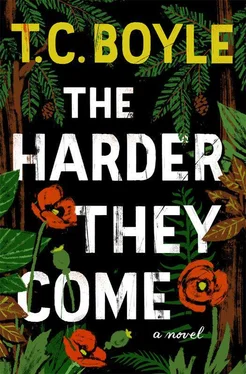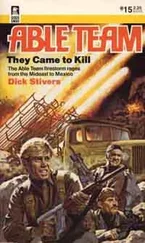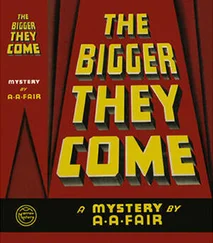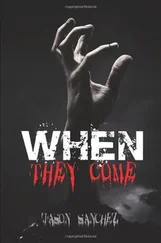“And now,” he said, his voice echoing in that acoustic desert till it came back to him as the last desperate gasp of a man withering under the sun that wasn’t the sun at all but the 1,500-watt theatrical spotlight installed by Rainier Holcomb, the deaf electrician, now dead, under Sten’s own mandate, “I’ll hand the mike over to Sheriff Rankin.” He nodded at the radiant bald head and glittering badge of the loose-limbed man in uniform sitting amongst the twelfth graders in the front row. “Who’ll say a few words and then take your questions.” Then, gathering himself up, he went on back to find his seat beside Carolee.
The rest turned into a kind of drowsy meditation, the auditorium overheated, the sheriff droning on in a sleepwalker’s voice, the questioners by turns timid and outraged but performing their roles just exactly as expected, Should we keep our doors locked? Is it safe to be out at night? Why don’t you arrest them at the supermarket, tell me that? You want perpetrators, I’ll show you perpetrators! Twice he felt the sharp reminder of Carolee’s index finger probing his ribs and realized he’d drifted off, an embarrassment at any time but doubly so now, here in the high school auditorium with Carey dead and people looking to him to provide guidance and support. Problem was, he didn’t want to provide guidance and support. He just wanted to go home. To bed.
Finally, as things were winding down — the sheriff had been asked the same question for the sixth or seventh time and gave the same tired answer, to wit, “We’ll know more when the facts are in,” and somebody said, “So you don’t advise going out in the woods right now, for any purpose?” and the sheriff said, “No, not really, not until we clear this thing up”—Sten felt himself come awake in a way he’d never been awake before, as if he was an animal seized in the jaws of a bigger animal and shaken helplessly. The woods. Out in the woods. He’d actually placed a call to Cody Waters’ parents — yesterday, with Carolee fretting and all the shit raining down around them — and got Cody’s cellphone number and gone outside where she wouldn’t hear and punched it in. A voice answered—“ Digame ”—and he thought he had the wrong number but persisted anyway. “Cody?” he’d said. “Is that you?”
“Who’s this?”
“Sten. Adam’s father?”
A silence. Then, “Yeah?”
“Was that Spanish you were talking?
“I guess.”
Another silence.
“Listen, I was calling because I wanted to ask if you’ve seen Adam lately. You know he moved out of the house by the river, right?”
“Yeah, I guess.”
“We just, well we haven’t heard from him and we were wondering if maybe he was up there with you—”
“No, no, he’s not here. I haven’t seen him in like a month maybe.”
There was static on the line, a faint sizzling in the background. “Did he say what his plans were? Where he’s living?”
He could picture the boy on the other end of the line, the sharp slash of his nose, the sloped shoulders and Don’t-Even-Ask look, the dreadlocks he and Adam used to wear before they gave up reggae for rap and then death metal and shaved their heads, before they went military and developed attitudes and started pushing the buttons of the police and everybody else too. When they were kids. Just kids.
A sigh. The sizzle of static. “I don’t know,” Cody said finally. “In the woods, I guess.”
THERE ARE THE NAMELESS fears and there are the named ones too. When he was a child his nightmares weren’t of ghouls or monsters or people chasing him with knives and axes and decapitated heads, but amorphous things, neither human nor animal, the fear that sat in your stomach, inside you, and you couldn’t define it or shake it either. That was what this was like. He didn’t say a word to Carolee, but the morning after the meeting he was up early, earlier than usual — first light — and he didn’t bother with breakfast because if he started fussing around in the kitchen she’d wake up and ask him where he was going and he’d just have to lie to her. His daypack — water in a bota bag, granola bars, binoculars, Swiss Army knife, matches stuffed in a plastic pill container to keep them dry, foil space blanket and GPS beacon for emergencies — was hanging on the coat tree where he always put it when he came in from one of his surveillance hikes. He pulled on a baseball cap — Oakland A’s, how about that? — patted down his pockets to make sure he had his wallet, keys and cellphone, and then headed out the door.
He drove up the north road, slowly, rolling over pinecones, fist-sized rocks, sticks and twigs and scraps of vegetation that had been pulverized by the tires of the emergency vehicles, looking for the spot where it had happened. Art had told him it was by the spring up there, no more than a thousand yards off the road, just follow the creek on up and you can’t miss it. Well, he couldn’t have missed it anyway because the tracks of the ambulance and the sheriff’s four-wheel drive came together there, crosshatching the road where they’d had to make their three-point turns to return with the body and whatever evidence they’d discovered. Which thus far was being kept secret. He’d tried to get Rob Rankin to tell him but Rob just shook his head. “Can’t disclose that. Sorry, Sten. Ongoing investigation.”
There would have been shell casings. And the bullets themselves, the ones they dug out of Carey’s dead flesh. That would have been something, at least. But what he wondered — and here he was, following a wide beaten path uphill through the bracken at the feet of the trees, the morning still, nothing moving and nothing sounding off, not even birds — was just what caliber those casings and bullets had turned out to be. Were they from a handgun? A revolver? An old wood-grip.38 or.45 some scoop-faced son of a bitch kept tucked in his waistband like a Hollywood cliché? Badges? We don’t need no stinking badges. Or something else. Something else altogether.
The only sound was the trickle of the stream, no wind in the trees and that eerie absence of birdcall, as if the place had been poisoned, as if the Zetas were just over the next rise with their human mules and their booby traps and their carbofuran. He never had found out what happened that day when they’d lost sight of the white truck and Carey phoned 911—there was nothing in the paper and he could only assume the Mexicans had gone off on a side road somewhere and waited an hour or two before doubling back. It was nothing to the cops. They had a whole lot on their hands and if every 911 call about people brandishing weapons didn’t have a scripted ending, so much the worse. But it was quiet. Too quiet. Quieter than any forest he could remember. He pricked up his senses. The air was damp with a funk of rot, of moss and mold and things breaking down, and underneath it the smell of water bubbling up out of some dark place. He forced himself to move slowly, step by step, studying the shadows where they deepened in clots of vegetation, listening hard, as if the perpetrators would be anywhere within ten miles of here — what did he think, they were going to kill somebody and then come back and lick the blood off the rocks? After a moment he went down on one knee to peer into the stream and see if he could detect any life there, nymphs, water boatmen, minnows as dull and gray and natural in these waters as the brick-red platys were in theirs. The water was pellucid. He saw nothing, not even a water strider.
He continued on up, the trees standing silent, the bushes increasingly beaten down and the ground raked over as he came closer to the dun scallop of rock where the spring emerged from the side of the mountain. There was a tree down just in front of the pool the spring made, cover for anyone lying in ambush, but then why would there be an ambush in this place? There was no plantation here, that was obvious. The trees were dense, closed in, the sunshine minimal. It was a water source, of course — they needed water, and they were known to divert whole streams as well as run drip lines hundreds of yards out into their makeshift clearings where they’d sacrificed the trees for the greater good of profit and criminality. What if — and he was speculating now — Carey had come upon a couple of them checking out the location or even laying out plastic tubing to take the water down to the road, to a catchment there or a tank in the back of a brand-new white Ford XLT pickup with all-terrain tires?
Читать дальше












